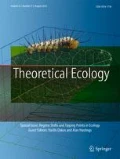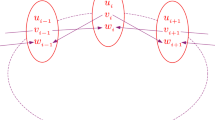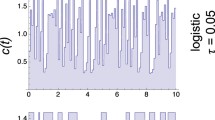Abstract
Critical transitions whereby small changes in conditions can cause large and irreversible changes in ecosystem states are a cause of increasing concern in ecology. Here, we focus on the irreversibility of these transitions, formally known as hysteresis. We explore how simple correlations between parameters in Lotka-Volterra predator-prey equations result in a variety of complicated hysteretic patterns. These patterns include “unattainable” stable states that once lost may never be recovered. We suspect these patterns to be common in natural systems, where interactions between diverse assemblages are unavoidable. Thus, understanding underlying hysteretic structures may be necessary for rescuing lost ecosystem states and avoiding future losses.





Similar content being viewed by others
References
Allee WC, Park O, Emerson AE et al (1949) Principles of animal ecology. Princ Anim Ecol
Anderson RM, May RM (1979) Population biology of infectious diseases: part I. Nature 280:361–367
Anderson RM, May RM (1990) Immunisation and herd immunity. Lancet 335:641–645. https://doi.org/10.1016/0140-6736(90)90420-A
Berryman AA (1982) Biological control, thresholds, and pest outbreaks. Environ Entomol 11:544–549. https://doi.org/10.1093/ee/11.3.544
Brook BW, Bradshaw CJA (2006) Strength of evidence for density dependence in abundance time series of 1198 species. Ecology 87:1445–1451. https://doi.org/10.1890/0012-9658(2006)87[1445:SOEFDD]2.0.CO;2
Carpenter SR, Ludwig D, Brock WA (1999) Management of eutrophication for lakes subject to potentially irreversible change. Ecol Appl 9:751–771. https://doi.org/10.1890/1051-0761(1999)009[0751:MOEFLS]2.0.CO;2
Comita LS, Muller-Landau HC, Aguilar S, Hubbell SP (2010) Asymmetric density dependence shapes species abundances in a tropical tree community. Science 329:330–332. https://doi.org/10.1126/science.1190772
Connell J (1971) On the role of natural enemies in preventing competitive exclusion in some marine animals and in rain forest trees. In: Dynamics of populations. Center for Agricultural Publication and Documentation
Courchamp F, Clutton-Brock T, Grenfell B (1999) Inverse density dependence and the Allee effect. Trends Ecol Evol 14:405–410. https://doi.org/10.1016/S0169-5347(99)01683-3
Elmhirst T, Connolly SR, Hughes TP (2009) Connectivity, regime shifts and the resilience of coral reefs. Coral Reefs 28:949–957. https://doi.org/10.1007/s00338-009-0530-8
Fauchald P (2010) Predator–prey reversal: a possible mechanism for ecosystem hysteresis in the North Sea? Ecology 91:2191–2197. https://doi.org/10.1890/09-1500.1
Foley B, Jones ID, Maberly SC, Rippey B (2012) Long-term changes in oxygen depletion in a small temperate lake: effects of climate change and eutrophication. Freshw Biol 57:278–289. https://doi.org/10.1111/j.1365-2427.2011.02662.x
Folke C, Carpenter SR, Walker B et al (2010) Resilience thinking: integrating resilience, adaptability and transformability. Ecol Soc 15:20
Giller KE, Beare MH, Lavelle P, Izac AMN, Swift MJ (1997) Agricultural intensification, soil biodiversity and agroecosystem function. Appl Soil Ecol 6:3–16. https://doi.org/10.1016/S0929-1393(96)00149-7
Hirota M, Holmgren M, Van Nes EH, Scheffer M (2011) Global resilience of tropical forest and savanna to critical transitions. Science 334:232–235
Howarth RW, Cole JJ (1985) Molybdenum availability, nitrogen limitation, and phytoplankton growth in natural waters. Science 229:653–655. https://doi.org/10.1126/science.229.4714.653
Huang W, Yu H, Weber WJ Jr (1998) Hysteresis in the sorption and desorption of hydrophobic organic contaminants by soils and sediments: 1. A comparative analysis of experimental protocols. J Contam Hydrol 31:129–148. https://doi.org/10.1016/S0169-7722(97)00056-9
Hughes TP, Carpenter S, Rockström J, Scheffer M, Walker B (2013) Multiscale regime shifts and planetary boundaries. Trends Ecol Evol 28:389–395. https://doi.org/10.1016/j.tree.2013.05.019
Janzen DH (1970) Herbivores and the number of tree species in tropical forests. Am Nat 104:501–528. https://doi.org/10.1086/282687
Knowlton N (1992) Thresholds and multiple stable states in coral reef community dynamics. Integr Comp Biol 32:674–682. https://doi.org/10.1093/icb/32.6.674
Kvenvolden KA (1988) Methane hydrate—a major reservoir of carbon in the shallow geosphere? Chem Geol 71:41–51
Lenton TM (2011) Early warning of climate tipping points. Nat Clim Chang 1:201–209
Magurran AE (1990) The adaptive significance of schooling as an anti-predator defence in fish. Ann Zool Fenn 27:51–66
May RM (1977) Thresholds and breakpoints in ecosystems with a multiplicity of stable states. Nature 269:471–477
Merton R (1998) Monitoring community hysteresis using spectral shift analysis and the red-edge vegetation stress index. pp 12–16
Möllmann C, Folke C, Edwards M, Conversi A (2015) Marine regime shifts around the globe: theory, drivers and impacts. Phil Trans R Soc B 370:20130260. https://doi.org/10.1098/rstb.2013.0260
Mumby PJ, Hastings A (2008) The impact of ecosystem connectivity on coral reef resilience. J Appl Ecol 45:854–862. https://doi.org/10.1111/j.1365-2664.2008.01459.x
Noy-Meir I (1975) Stability of grazing systems: an application of predator-prey graphs. J Ecol 63:459–481. https://doi.org/10.2307/2258730
Ong TW, Vandermeer JH (2015) Coupling unstable agents in biological control. Nat Commun 6
Perfecto I, Vandermeer J (2015) Coffee agroecology: a new approach to understanding agricultural biodiversity, ecosystem services and sustainable development. Routledge
Petrie B, Frank KT, Shackell NL, Legget WC (2009) Structure and stability in exploited marine fish communities: quantifying critical transitions. Fish Oceanogr 18:83–101. https://doi.org/10.1111/j.1365-2419.2009.00500.x
Rocha J, Yletyinen J, Biggs R, Blenckner T, Peterson G (2015) Marine regime shifts: drivers and impacts on ecosystems services. Phil Trans R Soc B 370:20130273. https://doi.org/10.1098/rstb.2013.0273
Rosenzweig ML, MacArthur RH (1963) Graphical representation and stability conditions of predator-prey interactions. Am Nat 97:209–223
Scheffer M (2009) Critical transitions in nature and society. Princeton University Press
Scheffer M, Carpenter SR, Lenton TM, Bascompte J, Brock W, Dakos V, van de Koppel J, van de Leemput IA, Levin SA, van Nes EH, Pascual M, Vandermeer J (2012) Anticipating critical transitions. Science 338:344–348. https://doi.org/10.1126/science.1225244
Schreiber SJ (2003) Allee effects, extinctions, and chaotic transients in simple population models. Theor Popul Biol 64:201–209. https://doi.org/10.1016/S0040-5809(03)00072-8
Schröder A, Persson L, De Roos AM (2005) Direct experimental evidence for alternative stable states: a review. Oikos 110:3–19. https://doi.org/10.1111/j.0030-1299.2005.13962.x
Shine R (2010) The ecological impact of invasive cane toads (Bufo Marinus) in Australia. Q Rev Biol 85:253–291. https://doi.org/10.1086/655116
Staver AC, Archibald S, Levin SA (2011) The global extent and determinants of savanna and forest as alternative biome states. Science 334:230–232
Strogatz S (2001) Nonlinear dynamics and chaos: with applications to physics, biology, chemistry and engineering. Perseus Books Group
Thom R (1969) Topological models in biology. Topology 8 (3):313–335
van Nes EH, Scheffer M (2004) Large species shifts triggered by small forces. Am Nat 164:255–266. https://doi.org/10.1086/422204
Vandermeer J, Granzow de la Cerda I, Perfecto I et al (2004) Multiple basins of attraction in a tropical forest: evidence for nonequilibrium community structure. Ecology 85:575–579. https://doi.org/10.1890/02-3140
Vandermeer J, King A (2010) Consequential classes of resources: subtle global bifurcation with dramatic ecological consequences in a simple population model. J Theor Biol 263:237–241. https://doi.org/10.1016/j.jtbi.2009.12.006
Vandermeer J, Yodzis P (1999) Basin boundary collision as a model of discontinuous change in ecosystems. Ecology 80:1817–1827. https://doi.org/10.1890/0012-9658(1999)080[1817:BBCAAM]2.0.CO;2
Wang R, Dearing JA, Langdon PG, Zhang E, Yang X, Dakos V, Scheffer M (2012) Flickering gives early warning signals of a critical transition to a eutrophic lake state. Nature 492:419–422. https://doi.org/10.1038/nature11655
Acknowledgements
We would like to thank Gyuri Barabas for the help with numerical approximations of critical transition points.
Funding
This study was funded by the Ecology and Evolutionary Biology Department and the Rackham Graduate School at the University of Michigan.
Author information
Authors and Affiliations
Corresponding author
Rights and permissions
About this article
Cite this article
Ong, T.W.Y., Vandermeer, J. Multiple hysteretic patterns from elementary population models. Theor Ecol 11, 433–439 (2018). https://doi.org/10.1007/s12080-018-0376-1
Received:
Accepted:
Published:
Issue Date:
DOI: https://doi.org/10.1007/s12080-018-0376-1




